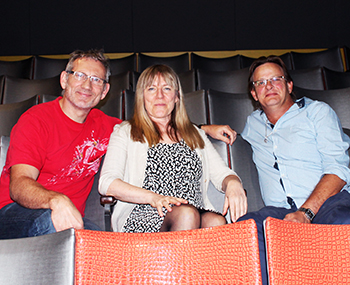Latest News Archive
Please select Category, Year, and then Month to display items
12 October 2020
|
Story Arina Engelbrecht
|
Photo Supplied
 Arina Engelbrecht from Organisational Development and Employee Well-being believes physical activity has a number of benefits for one’s health, including stress relief.
Arina Engelbrecht from Organisational Development and Employee Well-being believes physical activity has a number of benefits for one’s health, including stress relief.
Being physically active plays a big role in preventing the development of mental-health problems and in improving the quality of life of people experiencing mental-health problems.
Treatment for depression
Physical activity can be an alternative treatment for depression. It can be used as a stand-alone treatment or in combination with medication and/or psychological therapy. It promotes all kinds of changes in the brain, including neural growth, reduced inflammation, and new activity patterns are formed that promote feelings of calm and well-being. It releases endorphins – powerful chemicals in the brain that energise your spirit and make you feel good.
Physical activity can be very effective in relieving stress. Research in adults has found that physically active individuals tend to have lower stress levels compared to individuals who are less active. It also leads to improved sleep. When a person sleeps better and feels more rested, overall quality of life improves. They cope better with daily life stressors.
Reduce Alzheimer's risk
Regular physical activity can reduce your risk of developing Alzheimer's disease by up to 50%. It can also slow down further deterioration in those who have already started to develop cognitive problems. It stimulates the brain’s ability to maintain old connections as well as to make new ones.
A study asked people to rate their mood immediately after periods of physical activity (e.g. going for a walk/run, cycling, doing housework) and periods of inactivity (e.g. reading a book or watching television). Researchers found that participants felt more content, more awake, and calmer after being physically active compared to after periods of inactivity.
In conclusion, people who are physically active feel a sense of well-being, feel more energetic throughout the day, sleep better at night, have sharper memories, and feel more relaxed and positive about themselves and their lives.
“Being physically active not only changes your body, it changes your mind,
attitude, and your mood.” – Arina Engelbrecht
Prof Van den Oever gives students a different perspective
2016-05-06

Prof Annie van den Oever from the Netherlands presented a series of guest lectures on media technologies to students of the Film and Visual Media Programme at the University of the Free State (UFS). Here from left is Chris Vorster, lecturer in Drama and Theatre Arts, Prof Van den Oever, and Dr Pieter Venter, Senior lecturer at Drama and Theatre Arts.
Photo: Jóhann Thormählen |
She played a part in conceptualising the Film and Visual Media Programme at the University of the Free State (UFS), and sees film from a perspective different from most young South Africans.
According to Chris Vorster, lecturer of the UFS BA Honours degree in Film and Visual Media, this is one of the reasons why Prof Annie van den Oever’s visit is of such great value. The actor, who is a lecturer in Drama and Theatre Arts, believes it is important to expose his students to influences outside their normal experience.
Prof Van den Oever, an extraordinary professor at the UFS since 2011, presented a series of guest lectures on media technologies from 11-14 April 2016 at the Audio Visual Studio on the Bloemfontein Campus. She is a senior researcher for Film at the University of Groningen in the Netherlands, and an Associated Researcher for Film at Paris 1, Panthéon Sorbonne, in France.
Another milieu
“It is invaluable for students, in any field of study, to receive as many influences from the outside. Therefore, it is important to have someone here from another milieu and context. And academically, she is outstanding,” says Vorster.
Vorster’s students are also exposed to practical expertise from the industry in the country, not only academics.
Relationship with UFS
Prof Van den Oever says she usually visits the UFS twice a year. Her recent lecture series on media technologies was about the power of visual and film culture today, and how you can understand its powers. “Why strange effects work strongly and why the strange is inserted, because people respond strongly to them,” she says.
Prof van den Oever enjoys meeting new people, and often works with colleagues from the UFS on various projects. She also is full of praise for the management of the university. “It is great to work across cultures, and be part of a university in transition.”